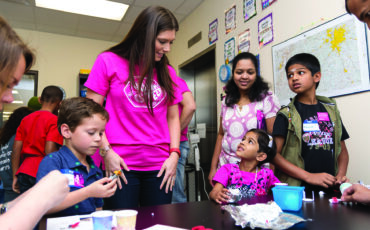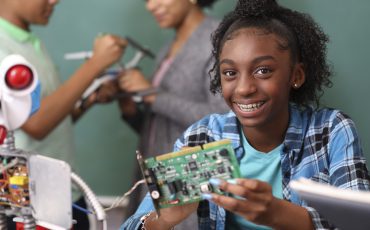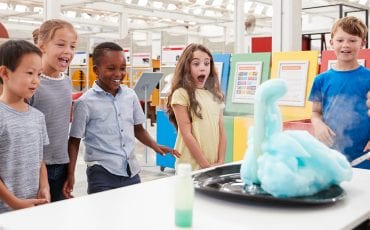Fun STEAM Programs and Activities for Kids

STE(AM) Truck
There are so many ways to learn about STEAM! These museums, programs, online resources and at-home activities will help kids get engaged and excited about STEAM.
Table of Contents
STEAM Out and About
These local museums and attractions do a great job of introducing the concepts of science, technology, engineering, art and math, and how they can be used together to solve challenges in today’s world.
Children’s Museum of Atlanta
Reinforce STEAM concepts through hands-on fun at CMA. In Tools for Solutions, kids can learn about simple machines. Explore the inner workings of the body, light and energy, technology and more in the Step Up to Science exhibit. Atlanta.
Tellus Science Museum
This museum has four interactive galleries to explore—Mineral, Fossil, Science in Motion and My Big Backyard—as well as a planetarium and observatory. Special exhibits and hands-on events like model rocket workshops and sky watches teach kids more about STEM concepts. Cartersville.
Fernbank Museum
Programs at Fernbank’s interactive STEM lab connect scientific concepts such as aerodynamics and chemistry with the arts and humanities. The Fantastic Forces exhibit explores combustion, aerodynamics, plate tectonics and more. Atlanta.
High Museum of Art
In addition to exploring the High’s art collections, families can collaborate on a work in the Greene Family Learning Gallery, a child-centered space with multi-sensory elements and hands-on activities. Enjoy family activities with events like Toddler Thursday, Weekend Family Tour and Second Sunday. Atlanta.
Museum of Aviation
Explore a collection of more than 85 U.S. Air Force aircraft, missile, cockpits and exhibits at this museum. The Museum’s National STEM Academy, in partnership with NASA, offers hands-on STEM programs, workshops and special events. Warner Robins.
Fernbank Science Center
The Fernbank Science Center is operated by the DeKalb County School System. It includes a planetarium, an observatory with the largest telescope in the southeastern U.S., live animal displays and an Apollo 6 Command Module exhibit. Atlanta.
Chattahoochee Nature Center
Explore 127 acres of forests, wetlands, trails, ponds and exhibits at this center, right here in metro Atlanta. Animal encounters, educational exhibits and special programs engage kids’ natural curiosity. Roswell.
Delta Flight Museum
Located at Delta headquarters near Hartsfield-Jackson International Airport, learn about aviation history through interactive exhibits, planes dating back to the 1920s and the only Boeing 737 flight simulator open to the public. Atlanta.
Computer Museum of America
Explore the technology of the past, present and future through fascinating exhibits at CMoA, including a collection of supercomputers, STEAM timeline, an enigma machine and more. Roswell.
Mercedes-Benz Stadium STEAM Tour Experience
This guided tour of the LEED-certified stadium helps kids understand how STEAM elements operate in the building, including its design and engineering, and how STEAM careers align with the sports and entertainment industry. Atlanta.
MODA
The Museum of Design Atlanta showcases how design can be found everywhere in the world. Visit to check out the current exhibition depicting the connection between architecture and hip-hop music, and virtual exhibits are available on their website. Youth programming includes classes on robotics, game design, Minecraft and more. Atlanta.
David J. Sencer CDC Museum
Learn how scientists merge old-fashioned detective work with high-tech science to crack the cases of mystery diseases at the CDC Museum. Its exhibitions focus on a variety of public health topics, as well as the history of CDC. Atlanta.
Gwinnett Environmental and Heritage Center
Hands-on exhibits at this science center include Discover H2O, where kids can learn about water use and its impact on our daily lives. The Water Ways diorama features historical and modern-day feats of engineering. Buford.
ChildrenConnect Museum
Budding engineers can create with LEGO bricks and K’Nex blocks, build fossils and more in the Connecting Room. In the Imagination Room, kids can build and experiment with creative materials and make crafts. Newnan.
Interactive Neighborhood for Kids
INK’s hands-on learning exhibits include the Pinnacle Bank area, where kids can practice handling and counting money, fill out bank deposit slips, make deposits, and visit the bank’s vault. Gainesville.
Michael C. Carlos Museum
With collections from continents and ancient civilizations from around the world, the Carlos Museum connects the past and the present. Exhibits and programs encourage visitors to look closer and explore their own creativity. Atlanta.
Discover Science Center
Young explorers’ labs, after-school programs and more introduce kids to scientific topics like botany, marine science, the elements and more. Roswell and Peachtree City.
More Places to Visit:
Atlanta History Center
LEGO Discovery Center
Center for Puppetry Arts
Dunwoody Nature Center
The Southern Museum
Southeastern Railway Museum
Army Aviation Heritage Foundation and Flying Museum
Callanwolde Fine Arts Center
Atlanta Contemporary
Hammonds House Museum
The Apex Museum
Atlanta Monetary Museum/Federal Reserve Bank of Atlanta
STEAM Programs For Kids
The EAA Young Eagles Program gives kids ages 8-17 their first ride in an airplane, helping to introduce and inspire kids in the world of aviation.

Ron Alexander Youth Aviation Program
The Ron Alexander Youth Aviation Program at Peach State Aerodrome provides kids ages 14-18 guidance and mentorship in exchange for flight time towards a sport pilot or private pilot’s certificate; peachtreestateaero.com. The Civil Air Patrol Cadet Program for ages 12-20 helps build skills in leadership, aerospace, fitness and character.
Saturdays with STE(A)M
This free monthly event for families, has with hands-on activities to challenge and inspire kids. Upcoming events are on March 16, April 27 and May 18 at Pittsburgh Yards.
Emory Math Circle is a free enrichment program taught by PhD students and faculty from Emory and Georgia Tech. Kids in middle and high school learn how to think logically and creatively while developing a passion for mathematics. Classes are held in the spring and fall.
Morehouse School of Medicine STEAM Academy
This program immerses kids in grades 4-8 in the world of STEAM and explores its interrelation to health and medical professions. Saturday sessions are in fall and spring; a 4-week summer session is also available.
Saturday STEAM programs at Georgia Tech include K.I.D.S. Club for grades 2-5 and STEAM Workshops for grades 6-12. Both encourage kids to study and pursue careers in STEAM with hands-on activities, problem-solving and teamwork. Sessions run from September-April.
Saturday STEM Workshops take place in an informal setting where kids can learn, explore and collaborate. Robotics, 3-D printing, drones, makerspace projects and more help introduce STEM concepts. Check the website for dates, scholarship information, and summer camp details.
Kids with an interest in leadership can apply to be 4H Stem Ambassador program. During a one-year commitment, ambassadors undergo extensive training and develop programs to bring STEM education to kids in their community. Applications are due in late March for the coming 2024-5 session. georgia4h.org
Superhero Science, a STEM enrichment program from Club SciKidz, is an after-school program available at participating schools and other locations in the metro area. Kids in grades K-6 learn science concepts through observation, measurement and experimentation. See the website for locations and summer camp information.
During after-school programs, kids team up to solve challenges using everyday items in their treasure chest. Groups meet weekly over a 12-14 week period at a variety of Atlanta-area schools; see the website for locations and dates, as well as summer camp information.
STEAM Saturdays are for kids ages 8-16. Monthly topics include artificial intelligence, engineering, cybersecurity, programming and game design. Each 2-hour session is $25 and spring registration is now open. Sessions are held in Austell; summer camp and after-school programs are also available.
Programs are available through some metro Atlanta schools and at open-to-the-public locations. Spring courses include Jr. Explorers Club and Adventurers STEAM Club, with a focus on engineering, coding, robotics and more.
After-school enrichment programs from STEM Velocity include engaging topics like STEAM Cuisine, STEM Velocity Lab, Preschool STEM Lab, Robotics and Programming and more. The programs are held at various Atlanta area schools; check the schedule for availability and information on their summer camp program.
STEAM at the Library
There are lots of STEAM activities for kids are libraries across metro Atlanta! Cobb County Libraries host STEEM for TEENS, Mad Scientists Club and Preschool Storytime STEAM Lab. Dekalb County library locations offer Digital Creation Club, Coding Club and more. At Gwinnett Public Library locations, check out a variety of STEM learning labs in math, coding, science and technology. South Fulton Library hosts a free Southside STEM Enrichment Program for kids ages 8-16. Visit your local library to find a program.
STEAM in the Back Yard
Foster a love of STEAM at home with these fun and easy ideas.
Combine learning and fun with these at-home STEAM experiments and activities using materials you probably already have around the house.
Launch a Balloon Rocket: Tie one end of a piece of string to a tree or post. Thread a drinking straw onto the string; tie the other end to another tree at the same height. Put two pieces of tape on the top of the straw. Blow up a balloon, hold the end to keep the air in, and use the tape to adhere it to the straw. Let the balloon go and witness the action and reaction of force.
Paint a Clothesline Masterpiece: Inspire kids to explore, experiment and create with paint. Hang an old sheet over a clothesline or fence; secure each corner with stakes or weights. Use large and small paintbrushes, kitchen sponges, fingers, or even natural objects, like a bundle of evergreen needles, to apply tempera paint.
Make a Sandbox Volcano: Fill a 16 ounce bottle about three-quarters full of water; add a few squirts of dishwashing liquid and 3-4 tablespoons of baking soda. Pack sand around the bottle in a volcano shape, leaving the top open. Pour in a cup of vinegar and experience the chemical reaction!
Shadow Tracking: Study the way shadows change throughout the day. Have your child stand on a sidewalk or driveway on a sunny day. Outline their shadow with chalk. Do this multiple times during the day to see how their shadow changes. Discuss why shadows get taller or shorter in relation to the earth’s movement.
Mix up Elephant Toothpaste: Make a foaming mix big enough for an elephant – but be sure to wear safety goggles and work in an area that can get messy. Pour ½ cup hydrogen peroxide in an empty plastic bottle. Add a squirt of liquid dish soap and a few drops of food coloring and swirl gently to mix. In a separate cup, mix one tablespoon of yeast and three tablespoons of warm water. Pour the yeast mixture into the bottle and step back!
 STEAM Online
STEAM Online
Use these virtual learning resources to introduce STEAM concepts or to reinforce what kids are learning in school.
STEM Ecosystems At-Home Lab
Maker challenges, invention, innovation and more! This series of workshops offers practical tips, virtual experiments and other STEM learning activities using tools that families have around the house.
Kids Next Code
Kids ages 5-18 can take STEM courses like coding, game design, engineering and robotics, and website creation. The company puts an emphasis on teaching the underserved, including minorities and women; the Atlanta-based company also has partnerships with local libraries and schools.
STEM Behind Cool Careers
Check out Texas Instruments’ video series, which connects algebra, geometry and physics to jobs like fashion design, sports, health and more.
NASA
The National Aeronautics and Space Administration has crafting ideas, science experiments, videos, coloring pages, podcasts, virtual tours, e-books and more for an in-depth look at space exploration, aeronautics and earth science.
StudyJams!
This website from Scholastic features four different characters who will help you dive in to math and science topics, such as volcanoes, photosynthesis, word problems and more.
Funbrain
Games, videos and books make learning a breeze, and you can browse topics by grade. In the Math Zone, play games to improve math skills, including geometry, operations and more.
Tate Kids
From Tate, four art galleries in London, Liverpool and Cornwall, this website explores famous artists and artworks, creative activities, crafts and more, along with fun games and quizzes for artistic adventures.
Crayola
The website offers a collection of fun, creative activities, games, videos, free coloring pages and more.
Math Game Time
For students in grades Pre-K through 7th, this site teaches addition, algebra, geometry, problem-solving and more with games, videos and worksheets.

Bitsbox
STEAM in a Box
With complete supplies and instructions for projects mailed monthly, subscription boxes offer variety and keep kids interested in learning.
Steve Spangler Science Club
“DIY Sci” television host Steve Spangler has created science kits with materials for up to five activities, experiments and design challenges. Step-by-step instruction cards help kids learn the science behind each experiment. Ages 5-12; $24.99/month.
Creation Crate
From a weather station to an alarm clock, Creation Crate’s electronics-based kits teach real-world skills and become more challenging as the builder gains experience. An online classroom offers video tutorials, exercises and troubleshooting support. Ages 7-11; ages 12 and up; $29.99/month.
Green Kid Crafts
These hands-on science and art kits feature themes such as electricity, ocean science or music and contain instructions and materials for 4-8 STEAM projects. Also included is a 12-page booklet with more hands-on activities, parent resources and puzzles. Ages 3-10+; $24.95/month.
Bitsbox
Bitsbox teaches coding and computer science through app building. Kids choose an app, then build, customize and use it on any mobile device. Activities like Bug Blaster, Cookiesnitch and 333 Little Pigs make it entertaining. Each box has enough materials for siblings to share. Ages 6-12; $16.95/month.
STEM Discovery Boxes
Kids ages 7 and up can learn about concepts in electronics, chemistry, physics, astronomy and more with this program. Each box contains complete materials and instructions to build three projects, plus activity cards and educational information. Ages 7 and up; $24.95/month.
–Mary Williams







